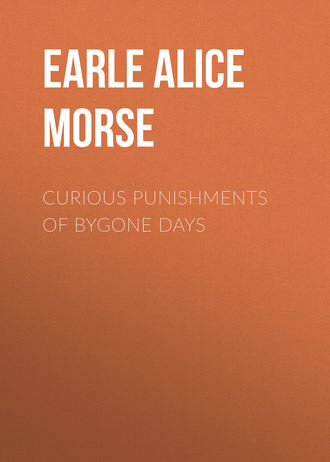 полная версия
полная версияПолная версия
Curious Punishments of Bygone Days
In Salem men and women offenders constantly pleaded commutation through benefit of clergy. In 1750 a counterfeiter of that time was sentenced to death. He pleaded benefit of clergy, and was respited, and instead of his original sentence was burnt in the hand. A woman for polyandry was similarly benefited by the same plea. This power of claiming amelioration of sentence lasted in Massachusetts till the year 1785, when it was forever nullified by the laws of Massachusetts under the new United States. In Virginia, benefit of clergy was a constant plea, and was recognized in all cases save, as has been said, in hog-stealing.
In Maryland branding was legal, and every county was ordered to have branding-irons. The lettering was specifically defined and enjoined. S. L. stood for seditious libel, and could be burnt on either cheek. M. stood for manslaughter, T. for thief, and could be branded on the left hand. R. was for rogue or vagabond, and was branded on the shoulder. Coiners could for the second offense be branded on the cheek F. for forgery.
Burglary was punished in all the colonies by branding. By the Provincial laws of New Hampshire, of 1679, a burglar was branded with a capital B in the right hand for the first offense, in the left hand for the second, “and if either be committed on the Lord’s Daye his Brand shall bee sett on his Forehead.” By Governor Eaton’s Code of Laws for the Connecticut colonists the punishment was equally severe.
“If any person commit Burglary or rob any person on the Lord’s Day he shalbe burned and whipped and for a second offense burned on the left hand, stand in the Pillory and wear a halter around his neck in the daytime visibly as a mark of infamy.”
A forger of deeds could be branded in the forehead with the letter F; while for defacing the records the offender could be disfranchised and branded in the face. A forger was branded in Worcester in 1769. A man who sold arms and powder and shot to the Indians was branded with the letter I. Counterfeiters were branded and often had the ears cropped.
A conviction and sentence in Newport in 1771 was thus reported in the daily newspapers:
“William Carlisle was convicted of passing Counterfeit Dollars, and sentenced to stand One Hour in the Pillory on Little-Rest Hill, next Friday, to have both Ears cropped, to be branded on both Cheeks with the Letter R, to pay a fine of One Hundred Dollars and cost of Prosecution, and to stand committed till Sentence performed.”
In Virginia many offenses were punished by loss of the ears or by slitting the ears. Among other penalties decreed to “deceiptful bakers,” dishonest cooks, cheating fishermen, or careless fish dressers was “to loose his eares.”
Truly long hair and wigs had their ulterior uses in colonial days when ear-cropping was thus rife. Romantic old tales of life on the road tell of carefully hidden deformities, of mysterious gauntleted strangers, whose hands displayed when revealed the lurid brand of past villainies. Life was dull and cramped in those days, but there were diversions; when the breeze might lift the locks from your friends or your lover’s cheek and give a glimpse of ghastly hole instead of an ear, or display a burning letter on the forehead; when his shoulder under his lace collar might be branded with a rogue’s mark, or be banded beneath his velvet doublet with the scars and welts of fierce lashes of the cat-o’-nine tails.
Brand and brank have passed away, the stocks and pillory no longer grace our village greens. We pride ourselves on our humanity, our justice. Therefore it may be well to note that we have now in the United States the most extreme code in the entire world in regard to capital punishment – sixty-two crimes punishable by death. A bill is before the Senate to strike sixteen offenses from our brutal list. Belgium, Holland, Brazil, Italy, Portugal, Gautemala, Venezuela and Costa Rica have wholly abolished the death penalty. In cruel Russia the death sentence has been since 1753 never pronounced save for treason, while China has only eleven capital offenses. We have adhered to obsolete English laws while England has done away with them and has now only four capital crimes. It is certainly surprising and even mortifying to know that in Maryland setting fire to a hay-rick is to this day punishable by death.





